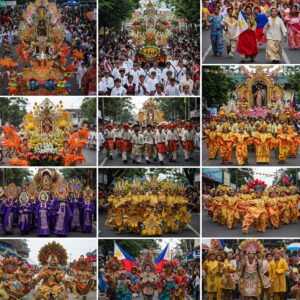
Simbang Gabi: A Filipino Christmas Tradition with Deep Roots
Christmas in the Philippines is not just a holiday — it’s a season, a feeling, and, most importantly, a celebration of faith. One of the most cherished and iconic Filipino Christmas traditions is Simbang Gabi (or “Night Mass”), a novena of nine dawn masses that lead up to Christmas Day. But Simbang Gabi is so […]
Read More
The Evolution of Philippine Holidays: From Colonial Influences to Modern Celebrations
The Philippines, an archipelago of over 7,000 islands, boasts a rich tapestry of holidays that reflect its complex history and diverse cultural influences. From indigenous traditions to colonial legacies and modern innovations, let’s embark on a journey through time to explore the evolution of Philippine holidays. Pre-Colonial Celebrations: Dancing with the Deities Before the arrival […]
Read More
Bonifacio Day: Remembering the Father of the Philippine Revolution
Growing up in the bustling district of Tondo, Manila, Andres Bonifacio’s early life wasn’t exactly the stuff of privileged childhood dreams. Born on November 30, 1863, to Santiago Bonifacio and Catalina de Castro, young Andres faced adversity early when both his parents passed away due to illness when he was just a teenager. As the […]
Read More
Filipino Ghost Stories: Beyond the “White Lady” – A Deep Dive into Regional Folklore
The Philippines, with its rich tapestry of cultural heritage spanning over 7,640 islands, harbors an intricate web of supernatural beliefs and ghost stories that extend far beyond the commonly known “White Lady” apparitions. These paranormal tales, passed down through generations, reflect the archipelago’s complex history, diverse ethnic backgrounds, and deep-rooted spiritual traditions. According to the […]
Read More
A Spooktacular Fiesta: Celebrating All Saints’ Day & All Souls’ Day in the Philippines
The Philippines, a land of vibrant culture and deep-rooted traditions, has a unique way of honoring the departed during All Saints’ Day (Araw ng mga Santo) and All Souls’ Day (Araw ng mga Patay). These holidays, observed on November 1st and 2nd respectively, are a time for families to come together, remember loved ones, and […]
Read More
The “Aswang” Phenomenon: Fear, Fascination, and Social Control
The aswang, a shape-shifting creature deeply embedded in Filipino folklore, represents more than just a mythological entity – it embodies complex social dynamics, psychological fears, and cultural mechanisms of control that have persisted for centuries. This feared creature, which has multiple manifestations across different regions of the Philippines, continues to captivate both local communities and […]
Read More
The “Manananggal” in Philippine Cinema: Horror and Social Commentary
The manananggal, a distinctive creature in Philippine folklore, has been a compelling figure in Filipino cinema for decades, serving as both a source of terror and a vessel for social commentary. This visceral mythological being – a vampire-like creature capable of splitting its body in half and flying with bat-like wings – has captured the […]
Read More
The Kapre in Filipino Literature: Symbolism and Interpretations
In the rich tapestry of Philippine folklore and mythology, few creatures capture the imagination quite like the Kapre – a towering, dark-skinned humanoid entity known for smoking tobacco while perched atop ancient trees. According to scholarly works, including Maximo Ramos’s “The Creatures of Philippine Lower Mythology” (1971), the Kapre represents one of the most enduring […]
Read More
Filipino Urban Legends: From Elevator Ghosts to Haunted Malls – A Modern Look at Contemporary Folklore
The Philippines, with its rich cultural tapestry and deep-rooted spiritual beliefs, has given birth to numerous urban legends that continue to captivate and intrigue both locals and visitors alike. These modern myths, particularly those centered around urban spaces, reflect the fascinating intersection of traditional Filipino beliefs and contemporary life. Urban legends serve as powerful cultural […]
Read More
Filipino Tattooing: Reviving Ancient Traditions and Meanings
The practice of traditional Filipino tattooing, known as “batok” or “fatek” depending on the region, represents one of the oldest and most sophisticated forms of skin art in the Pacific. Archaeological evidence, including discovered human remains and historical accounts from Spanish colonizers dating back to the 16th century, indicates that tattooing was deeply embedded in […]
Read More